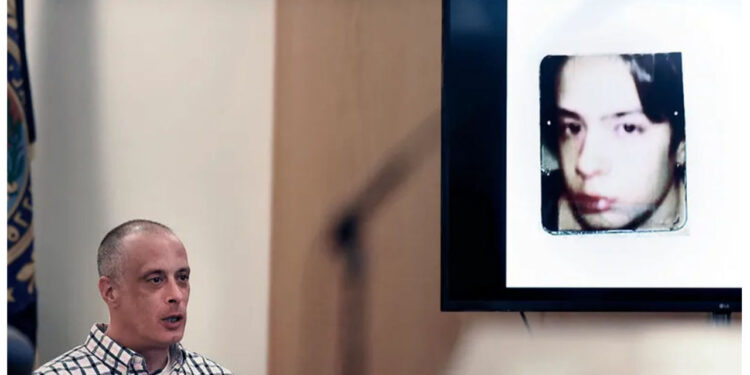In a historic case, a New Hampshire jury awarded $38 million to the man who exposed abuse allegations at the state’s adolescent detention center on Friday, finding that the state’s negligence allowed him to endure assault, rape, and solitary confinement as a teenager.
David Meehan’s attorney claimed his client was “overwhelmed and overjoyed” by what he described as the greatest jury award in a civil case in New Hampshire history; however, the state indicated the sum would be lowered to $475,000 under the state’s damage cap legislation.
“David now feels like he has a reason to live,” Meehan’s lawyer, Rus Rilee, stated.
Meehan, 42, reported to the police in 2017 and sued the state three years later. Since then, the state has arrested 11 former employees, and more than 1,100 former residents of Manchester’s Youth Development Center have filed lawsuits alleging physical, sexual, and emotional abuse over six decades.
Meehan’s was the first lawsuit filed and tried. After four weeks of testimony, jurors delivered a verdict in less than three hours.
“It highlights how strong all of these cases are against the state,” she said. “We’re going to expect a lot more quick verdicts against the state in hundreds and hundreds more of these cases.”
We advised jurors to calculate an amount that provided “full, fair, and adequate” compensation if they concluded the state was responsible for Meehan’s injuries. They granted $18 million in compensatory damages and $20 million in “enhanced” damages, which can be imposed if a defendant acted recklessly or misused their power. Despite the New Hampshire statute enabling plaintiffs against the state to recover up to $475,000 per occurrence, they asserted that Meehan had only demonstrated one “incident” or episode in which he suffered harm.
“The jury did find in favor of Mr. Meehan for $38 million, but they found only one incident of negligence against the Department of Health and Human Services,” Assistant Attorney General Brandon Chase stated. “Under state law, Mr. Meehan has a judgment in his favor of $475,000.”
However, Rilee declared that the state Supreme Court will decide the case after an appeal.
“There appears to be some confusion on the jury verdict form, but we’ll take care of that in Concord,” the prosecutor added. “The jury award is $38 million.”
Throughout the trial, the state claimed it was not accountable for the actions of “rogue” personnel and that Meehan waited too long to suit. The defense also said his case was based on “conjecture and speculation with a lot of inuendo mixed in.”
“Conspiracy theories are not a substitute for actual evidence,” said attorney Martha Gaythwaite during her closing address on Thursday.
The state called five witnesses to the stand, including Meehan’s father, who said “yes” when asked if his son had “a reputation for untruthfulness.” Others who testified included a longstanding juvenile center principal who said she observed no symptoms of abuse in four decades, as well as a doctor who diagnosed Meehan with bipolar disorder rather than post-traumatic stress disorder, as his side claimed.
Meehan’s lawyers accused the state of supporting a culture of abuse characterized by widespread brutality, corruption, and a code of silence. They called more than a dozen witnesses, including former staffers who claimed they were met with resistance and even threats when they raised or investigated concerns, a former resident who described being gang-raped in a stairwell, and a teacher who said she noticed suspicious bruises on Meehan and half a dozen other boys.
“They still don’t get it,” David Vicinanzo stated in his final remarks. “They don’t understand what power they had; they don’t understand how they abused it, and they don’t care.”
Meehan spent three days on the witness stand, detailing his three years at the Manchester facility and the consequences. A staffer viciously raped him in his first sexual encounter when he was 15 years old, and a person he thought was a kind father figure turned out to be a daily tormentor who once put a gun to his head during a sexual assault, Meehan told the jurors.
“I’m forced to try to hold myself together somehow and show, as a man, everything these people did to this little boy,” he went on to say. “I’m constantly paying for what they did.”
In cross-examining Meehan, the state’s prosecutors depicted him as a violent child who continued to cause trouble at the youth facility, as well as a deluded adult who exaggerates or lies for money. The strategy emphasized an unusual dynamic in which the attorney general’s office defends the state in civil disputes while also prosecuting suspected culprits in criminal cases.
Though the state plans to rely on Meehan’s testimony in criminal prosecutions, it attempted to undermine his credibility in the current case.
Rilee described the opposing counsel’s conduct as “despicable.”
“I think it was a really sad chapter in our state’s history to have victims of child abuse at the hands of state employees dragged into court, brutalized, and victim shamed the way David was,” he told the audience.
The outcome of Meehan’s case may have an impact on the criminal proceedings, the remaining lawsuits, and the state’s separate settlement fund established as an alternative to litigation. Claimants can receive up to $1.5 million through the settlement fund, but lawmakers are poised to raise the maximum to $2.5 million soon.










